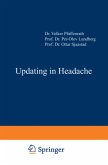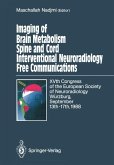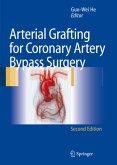Impact of Cardiac Surgery on the Quality of Life
Neurological and Psychological Aspects
Herausgegeben:Rodewald, G.; Willner, A. E.
Impact of Cardiac Surgery on the Quality of Life
Neurological and Psychological Aspects
Herausgegeben:Rodewald, G.; Willner, A. E.
- Broschiertes Buch
- Merkliste
- Auf die Merkliste
- Bewerten Bewerten
- Teilen
- Produkt teilen
- Produkterinnerung
- Produkterinnerung
Georg Rodewald University of Hamburg Hamburg, Federal Republic of Germany Allen E. Willner Hillside Hospital Glen Oaks, NY In contrast to the initial years of cardiac surgery (37 years ago), there is now increasing interest in cerebral protection. Rodewald [1] in 1978 was among the first to point out the surgeon's concern with "psychopathological problems" and Taylor [2] in 1989 stressed that" --- the awareness of the cerebral consequences of open heart surgery has risen considerably in recent years - - - " This book reviews the evidence for neurological, psychological, and neuropsycho logical…mehr
Andere Kunden interessierten sich auch für
![Updating in Headache Updating in Headache]() Updating in Headache41,99 €
Updating in Headache41,99 €![Cardiac Surgery Cardiac Surgery]() Donald B. DotyCardiac Surgery320,99 €
Donald B. DotyCardiac Surgery320,99 €![Clinical Psychology and Heart Disease Clinical Psychology and Heart Disease]() E. Molinari / A. Compare / G. Parati (eds.)Clinical Psychology and Heart Disease157,99 €
E. Molinari / A. Compare / G. Parati (eds.)Clinical Psychology and Heart Disease157,99 €![Imaging of Brain Metabolism Spine and Cord Interventional Neuroradiology Free Communications Imaging of Brain Metabolism Spine and Cord Interventional Neuroradiology Free Communications]() Imaging of Brain Metabolism Spine and Cord Interventional Neuroradiology Free Communications42,99 €
Imaging of Brain Metabolism Spine and Cord Interventional Neuroradiology Free Communications42,99 €![Cardiopulmonary Bypass Cardiopulmonary Bypass]() Cardiopulmonary Bypass122,99 €
Cardiopulmonary Bypass122,99 €![Arterial Grafting for Coronary Artery Bypass Surgery Arterial Grafting for Coronary Artery Bypass Surgery]() Guo-Wei He (ed.)Arterial Grafting for Coronary Artery Bypass Surgery157,99 €
Guo-Wei He (ed.)Arterial Grafting for Coronary Artery Bypass Surgery157,99 €![Psychoanalysis and Neuroscience Psychoanalysis and Neuroscience]() Psychoanalysis and Neuroscience169,99 €
Psychoanalysis and Neuroscience169,99 €-
-
-
Georg Rodewald University of Hamburg Hamburg, Federal Republic of Germany Allen E. Willner Hillside Hospital Glen Oaks, NY In contrast to the initial years of cardiac surgery (37 years ago), there is now increasing interest in cerebral protection. Rodewald [1] in 1978 was among the first to point out the surgeon's concern with "psychopathological problems" and Taylor [2] in 1989 stressed that" --- the awareness of the cerebral consequences of open heart surgery has risen considerably in recent years - - - " This book reviews the evidence for neurological, psychological, and neuropsycho logical reactions to cardiac surgery. In previous studies one problem is that small samples of patients were studied with different measuring instruments so that it was difficult to ma~e sense of inconsistent findings. Considerable controversy resulted with little ability to sort out discrepant findings. It appeared that a large multi center study using uniform measures might help clarify the picture.
Produktdetails
- Produktdetails
- Verlag: Springer / Springer US / Springer, Berlin
- Artikelnr. des Verlages: 978-1-4612-7908-2
- Softcover reprint of the original 1st ed. 1990
- Seitenzahl: 540
- Erscheinungstermin: 6. Oktober 2011
- Englisch
- Abmessung: 229mm x 152mm x 29mm
- Gewicht: 773g
- ISBN-13: 9781461279082
- ISBN-10: 1461279089
- Artikelnr.: 39678293
- Herstellerkennzeichnung Die Herstellerinformationen sind derzeit nicht verfügbar.
- Verlag: Springer / Springer US / Springer, Berlin
- Artikelnr. des Verlages: 978-1-4612-7908-2
- Softcover reprint of the original 1st ed. 1990
- Seitenzahl: 540
- Erscheinungstermin: 6. Oktober 2011
- Englisch
- Abmessung: 229mm x 152mm x 29mm
- Gewicht: 773g
- ISBN-13: 9781461279082
- ISBN-10: 1461279089
- Artikelnr.: 39678293
- Herstellerkennzeichnung Die Herstellerinformationen sind derzeit nicht verfügbar.
Psychiatric Issues.- Methods - Construction and Clinical Application of the Hamburg Rating Scale for Psychic Disturbances (HRPD).- Psychiatric Methods of the International Study: Hamilton Depression and Anxiety Scales.- Psychiatric Issues: Simple Frequencies Pre- and Postoperatively.- Fantasies Evoked by Cardiac Surgery.- The Evaluation of the Emotional Climate in the Families of Cardiac Surgery Patients.- Psychologic Sequelae of Cardiac Valve Implantation.- What Do Patients With Incomplete Postoperative Data Tell Us? The Problem of Fatal Outcome and Refusing Postoperative Testing: Psychiatric Aspects.- Psychological Adaptation of Patients 3 to 5 Years After Heart Surgery.- An Interpretive Study of the Metaphors Male Coronary Artery Surgery Patients Use to Describe the Surgical Experience.- Good Psychosocial Adaptation to Implantable Cardioverter Defibrillators.- Denial Among Cardiac Patients With the Automatic Implantable Cardioverter Defibrillator.- Neurological Issues.- The Susceptibility of the Central Nervous System to Open Heart Surgery.- Neurological Assessment of Early Cerebral Outcome After Coronary Bypass Surgery.- Automatic EEG Monitoring in Cardiac Surgery.- Magnetic Resonance Imaging of the Brain in Infants and Children Before and After Cardiac Surgery: A Prospective Study.- Cerebral Dysfunction in Elective Coronary Surgery.- Cerebral Blood Flow Regulation During Cardiopulmonary Bypass: Correlation With Postoperative Neurologic and Neuropsychologic Deficits.- Electroencephalogram-Based Prognosis of Cardiac Surgery - A Long-Term Follow-Up Study.- Psychometric Issues.- The Use of Cognitive Tests to Assess Cognitive Impairment in Cardiac Surgery Patients: With Emphasis on the CLAT Analogy Test.- Changes in Psychometric Test Scores After Cardiac Surgery.-The Persistence of Neuropsychological Deficits Twelve Months After Coronary Artery Bypass Surgery.- Neuropsychological Functioning Following Cardiopulmonary Bypass.- Reports of Cognitive Change, Mood State and Assessed Cognition Following Coronary Artery Bypass Surgery.- Memory Functioning After Cardiac Surgery With Cardiopulmonary Bypass: Comparisons Between Heart and Back Patients.- Neuropsychological Findings and Personality Structure Associated With Coronary Artery Bypass Surgery (CABS): An Eight Month Follow-Up Study.- Predicting Memory Outcome From Medical Variables After Cardiac Surgery With Cardiopulmonary Bypass.- Neuropsychological Impairment in Candidates for Cardiac Transplantation.- Medical/Surgical Data.- The Surgeon's Description of the Patient Population.- A Study of Equipment for and Performance of Extracorporeal Circulation.- Cerebral Protection During Cardiopulmonary Bypass: Devices and Techniques to Prevent Air Embolism.- Cerebral Blood Flow Declines Independently of Metabolism During Hypothermic Cardiopulmonary Bypass.- Emission of Micro-Bubbles in Bubble (BO) and Membrane-Oxygenators (MO): A Comparative Investigation.- Comparison of In-Hospital Conditions for "International Study" and "Non-Study" Patients.- Weight Gain and the Development of Sleep Apnea Following Heart Transplantation.- Correlations between Medical/Surgical Data and Postoperative Psychiatric, Neurological And Psychometric Condition.- Demographics of the Multi-Center Sample.- Type of Oxygenator, Type of Arterial Filter, and Bypass Time, in Relation to Outcome.- Several Parameters of Extracorporeal Circulation and Outcome.- Anesthesia and Psychometric Tests - Problems in Psychological Assessment of Cognitive Recovery After Anesthesia.- Arterial Line Filtration ReducesMicroembolism and Significantly Improves Neuropsychological Outcome in Coronary Artery Surgery.- Cerebral Microembolism and Neuropsychological Outcome Following Coronary Artery Bypass Surgery (CABS) With Either a Membrane or Bubble Oxygenator.- EEG Monitoring During Cardiopulmonary Bypass Procedures.- Success of the Low Flow - Low Pressure Perfusion in Reducing Postoperative Psychological Disturbances.- Review: Medical and Surgical Data.- Correlations between Psychiatric, Neurological and Psychometric Variables.- Correlations Between Psychiatric, Neurological and Psychometric Variables: Psychiatric and Psychometric Issues.- Correlations Between Psychiatric and Neurological Findings.- The Correlations Between Neurological and Neuropsychological Variables.- Prediction and Postoperative Outcome.- Can One Predict the Patient's Postoperative Psychiatric and Neurological Condition?.- Psychodynamic Prediction of Postoperative Mental Vulnerability.- The Relevance of Health Related Cognitions and Attitudes For the Prediction of Surgical Outcome.- The Relationship of Preoperative Anxiety and Postoperative Complications in Patients Having Open Heart Surgery.- Quality Of Life.- Quality of Life of Finnish Heart Surgery Patients Related to Results From Preoperative and Follow-Up Examinations.- Beck Depression Inventory Scores of Coronary Bypass Patients With and Without Psychological Intervention.- Quality of Life After Open Heart Surgery.- Quality of Life After Cardiac Surgery: Social and Environmental Aspects.- Quality of Life and Coping in Heart Transplant Recipients.- Development of a Construct of Psychological Dependency in Patients With the Automatic Implantable Cardioverter Defibrillator: A Quality of Life Issue.- Quality of Life Issues and Psychological TreatmentStrategies Affecting Coronary Artery Disease During Convalescence and Rehabilitation.
Psychiatric Issues.- Methods - Construction and Clinical Application of the Hamburg Rating Scale for Psychic Disturbances (HRPD).- Psychiatric Methods of the International Study: Hamilton Depression and Anxiety Scales.- Psychiatric Issues: Simple Frequencies Pre- and Postoperatively.- Fantasies Evoked by Cardiac Surgery.- The Evaluation of the Emotional Climate in the Families of Cardiac Surgery Patients.- Psychologic Sequelae of Cardiac Valve Implantation.- What Do Patients With Incomplete Postoperative Data Tell Us? The Problem of Fatal Outcome and Refusing Postoperative Testing: Psychiatric Aspects.- Psychological Adaptation of Patients 3 to 5 Years After Heart Surgery.- An Interpretive Study of the Metaphors Male Coronary Artery Surgery Patients Use to Describe the Surgical Experience.- Good Psychosocial Adaptation to Implantable Cardioverter Defibrillators.- Denial Among Cardiac Patients With the Automatic Implantable Cardioverter Defibrillator.- Neurological Issues.- The Susceptibility of the Central Nervous System to Open Heart Surgery.- Neurological Assessment of Early Cerebral Outcome After Coronary Bypass Surgery.- Automatic EEG Monitoring in Cardiac Surgery.- Magnetic Resonance Imaging of the Brain in Infants and Children Before and After Cardiac Surgery: A Prospective Study.- Cerebral Dysfunction in Elective Coronary Surgery.- Cerebral Blood Flow Regulation During Cardiopulmonary Bypass: Correlation With Postoperative Neurologic and Neuropsychologic Deficits.- Electroencephalogram-Based Prognosis of Cardiac Surgery - A Long-Term Follow-Up Study.- Psychometric Issues.- The Use of Cognitive Tests to Assess Cognitive Impairment in Cardiac Surgery Patients: With Emphasis on the CLAT Analogy Test.- Changes in Psychometric Test Scores After Cardiac Surgery.-The Persistence of Neuropsychological Deficits Twelve Months After Coronary Artery Bypass Surgery.- Neuropsychological Functioning Following Cardiopulmonary Bypass.- Reports of Cognitive Change, Mood State and Assessed Cognition Following Coronary Artery Bypass Surgery.- Memory Functioning After Cardiac Surgery With Cardiopulmonary Bypass: Comparisons Between Heart and Back Patients.- Neuropsychological Findings and Personality Structure Associated With Coronary Artery Bypass Surgery (CABS): An Eight Month Follow-Up Study.- Predicting Memory Outcome From Medical Variables After Cardiac Surgery With Cardiopulmonary Bypass.- Neuropsychological Impairment in Candidates for Cardiac Transplantation.- Medical/Surgical Data.- The Surgeon's Description of the Patient Population.- A Study of Equipment for and Performance of Extracorporeal Circulation.- Cerebral Protection During Cardiopulmonary Bypass: Devices and Techniques to Prevent Air Embolism.- Cerebral Blood Flow Declines Independently of Metabolism During Hypothermic Cardiopulmonary Bypass.- Emission of Micro-Bubbles in Bubble (BO) and Membrane-Oxygenators (MO): A Comparative Investigation.- Comparison of In-Hospital Conditions for "International Study" and "Non-Study" Patients.- Weight Gain and the Development of Sleep Apnea Following Heart Transplantation.- Correlations between Medical/Surgical Data and Postoperative Psychiatric, Neurological And Psychometric Condition.- Demographics of the Multi-Center Sample.- Type of Oxygenator, Type of Arterial Filter, and Bypass Time, in Relation to Outcome.- Several Parameters of Extracorporeal Circulation and Outcome.- Anesthesia and Psychometric Tests - Problems in Psychological Assessment of Cognitive Recovery After Anesthesia.- Arterial Line Filtration ReducesMicroembolism and Significantly Improves Neuropsychological Outcome in Coronary Artery Surgery.- Cerebral Microembolism and Neuropsychological Outcome Following Coronary Artery Bypass Surgery (CABS) With Either a Membrane or Bubble Oxygenator.- EEG Monitoring During Cardiopulmonary Bypass Procedures.- Success of the Low Flow - Low Pressure Perfusion in Reducing Postoperative Psychological Disturbances.- Review: Medical and Surgical Data.- Correlations between Psychiatric, Neurological and Psychometric Variables.- Correlations Between Psychiatric, Neurological and Psychometric Variables: Psychiatric and Psychometric Issues.- Correlations Between Psychiatric and Neurological Findings.- The Correlations Between Neurological and Neuropsychological Variables.- Prediction and Postoperative Outcome.- Can One Predict the Patient's Postoperative Psychiatric and Neurological Condition?.- Psychodynamic Prediction of Postoperative Mental Vulnerability.- The Relevance of Health Related Cognitions and Attitudes For the Prediction of Surgical Outcome.- The Relationship of Preoperative Anxiety and Postoperative Complications in Patients Having Open Heart Surgery.- Quality Of Life.- Quality of Life of Finnish Heart Surgery Patients Related to Results From Preoperative and Follow-Up Examinations.- Beck Depression Inventory Scores of Coronary Bypass Patients With and Without Psychological Intervention.- Quality of Life After Open Heart Surgery.- Quality of Life After Cardiac Surgery: Social and Environmental Aspects.- Quality of Life and Coping in Heart Transplant Recipients.- Development of a Construct of Psychological Dependency in Patients With the Automatic Implantable Cardioverter Defibrillator: A Quality of Life Issue.- Quality of Life Issues and Psychological TreatmentStrategies Affecting Coronary Artery Disease During Convalescence and Rehabilitation.








